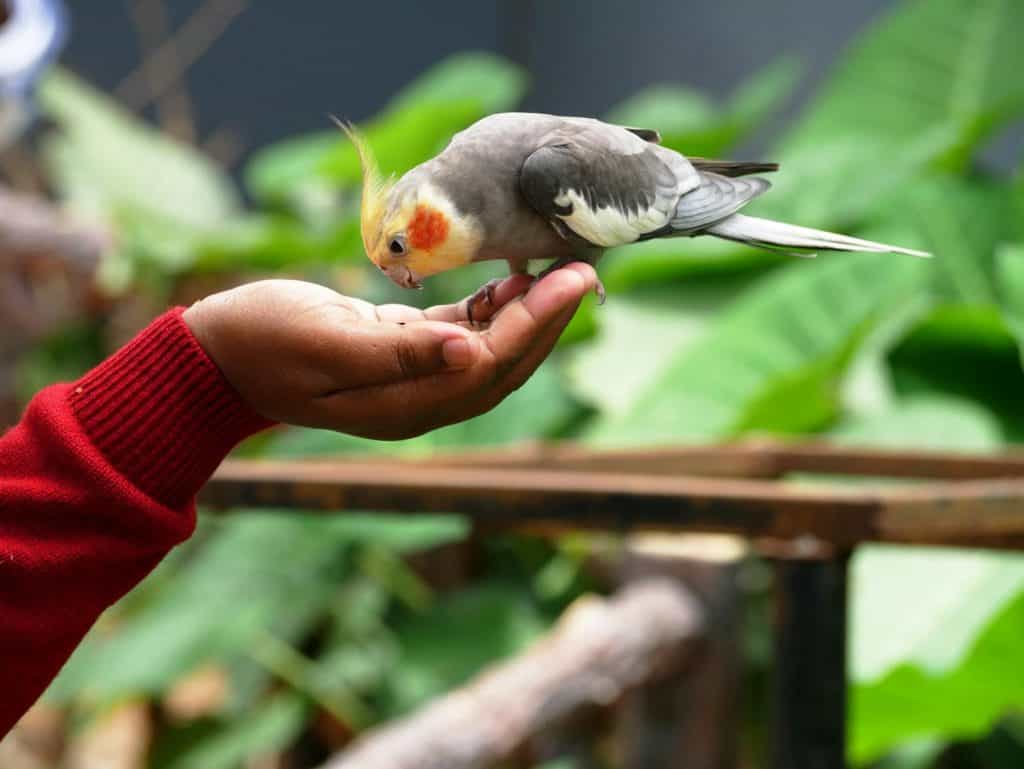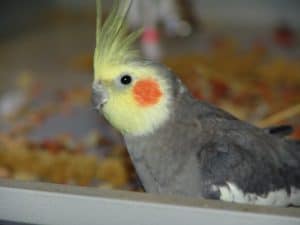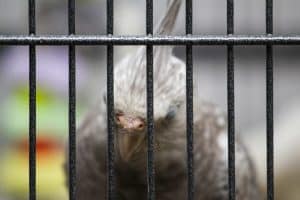Caring for a cockatiel every day involves more than just providing food and water; it’s about creating a nurturing environment that caters to their physical and emotional needs. If you’re wondering “how do you care for your cockatiel everyday,” you’re in the right place. These charming birds, known for their playful demeanor and impressive mimicry skills, require a consistent routine filled with interaction and care to thrive.
From selecting the right diet to ensuring they have enough mental stimulation, the daily care of your cockatiel is crucial. You’ll need to balance their nutritional needs with their social interactions and physical activities to keep them healthy and happy. Let’s dive into the essentials of daily cockatiel care to help you build a strong, loving relationship with your feathered friend.
Caring for a cockatiel every day involves more than just providing food and water; it’s about creating a nurturing environment that caters to their physical and emotional needs. If you’re wondering “how do you care for your cockatiel everyday,” you’re in the right place. These charming birds, known for their playful demeanor and impressive mimicry skills, require a consistent routine filled with interaction and care to thrive.
From selecting the right diet to ensuring they have enough mental stimulation, the daily care of your cockatiel is crucial. You’ll need to balance their nutritional needs with their social interactions and physical activities to keep them healthy and happy. Let’s dive into the essentials of daily cockatiel care to help you build a strong, loving relationship with your feathered friend.
Daily Care Routine for Your Cockatiel

Ensuring your cockatiel thrives involves a structured daily routine that caters to their physical and emotional needs. This section outlines the specific care routines to follow from morning to evening, helping you maintain a healthy and happy pet cockatiel.
Morning Care Essentials
Start each morning by checking the food and water dishes in your cockatiel’s cage. Replace any stale food with fresh seeds, pellets, and occasional treats such as millet sprays or leafy greens to keep your feathered friend energetic. It’s crucial to provide fresh water every morning to ensure your cockatiel stays hydrated.
Examine the cleanliness of the cage, especially the bottom where droppings accumulate. Remove waste daily to prevent bacterial growth and maintain a hygienic environment. Once the cage is clean, spend some time socializing with your cockatiel. Interaction and mental stimulation can be provided through talking, gentle handling, or allowing them out of the cage if it’s safe to do so. This bond-enhancing time is essential for their emotional well-being.
Inspect your bird’s feathers and overall appearance for signs of distress or illness, such as feather plucking or unusual droopiness. These checks help you catch any health issues early.
Evening Setup and Winding Down
As evening approaches, prepare your cockatiel for a calm night. Dimming the lights in the room gradually can signal to your cockatiel that it’s time to settle down, reducing the chance of night fright—a common issue in pet birds that can cause panic or injury.
Clean any food and water bowls if not done in the morning, ensuring there’s enough fresh food and water available through the night. Also, placing a cover over the cage can help create a sense of security and maintain an adequate sleeping environment, safe from drafts and excessive light.
Lastly, adding a special treat or a new toy occasionally in the evening can keep your cockatiel engaged and prevent boredom. Ensure toys are rotated regularly and that they are safe, without small parts that could cause injury. This routine not only meets their basic needs but also ensures they remain active and content.
Creating the Ideal Cockatiel Habitat
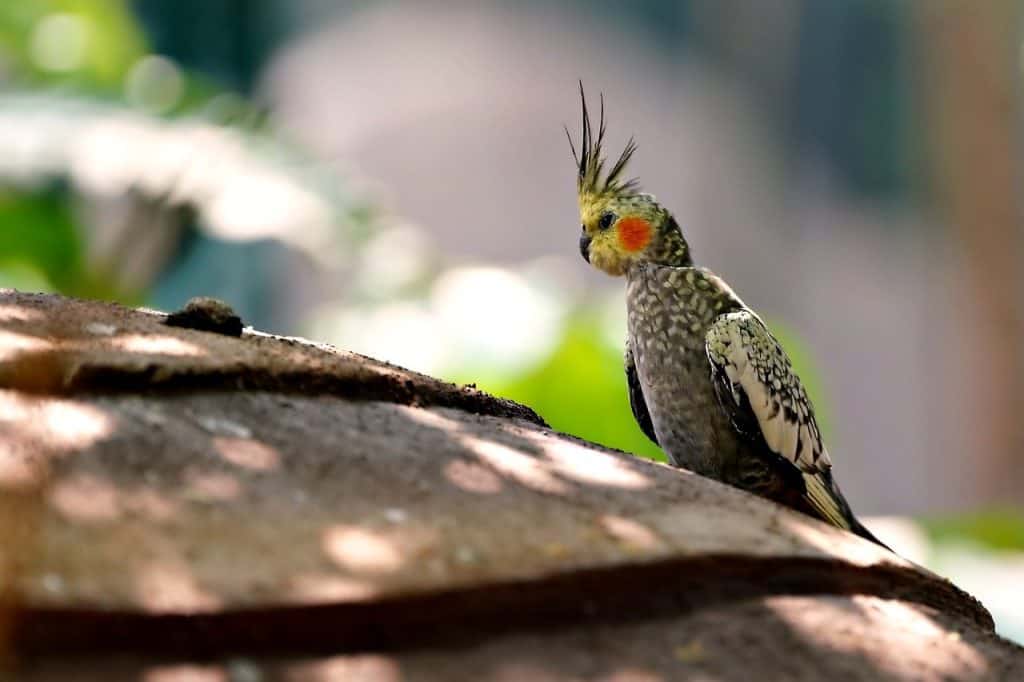
Creating an ideal habitat for your cockatiel involves selecting the right cage and accessories. These elements are crucial for ensuring your bird’s comfort, safety, and overall well-being. Here’s how you can set up an optimal living space for your feathered friend.
Selecting the Right Cage Size and Design
The size of the cage significantly affects your cockatiel’s quality of life. A cage, at minimum, should be large enough to allow your cockatiel to fully extend its wings without touching the sides. Optimal dimensions start around 24″x18″x24″, but if space allows, a larger habitat is always beneficial. Horizontal bars on the cage are important as they will enable climbing and other activities that contribute to physical health.
The design of the bird’s cage also matters. Ensure it’s constructed from safe, non-toxic materials with appropriate bar spacing—approximately 1/2 to 5/8 inch—to prevent escape or injury. The accessibility of doors and the ease of cleaning the tray at the bottom of the cage are additional considerations. Place the cage in a location free from direct sunlight and drafts, which can provide a stable environment critical for maintaining a healthy cockatiel.
Essential Accessories for Comfort and Engagement
Accessories enrich your cockatiel’s environment, promoting mental and physical health. Crucial accessories include perches of varying sizes and materials, such as natural wood, which help prevent foot problems and allow your bird to exercise its feet. At least two perches positioned at different heights and distances from the food dishes will encourage movement and activity.
Toys play a critical role in mental stimulation. Rotate toys regularly to keep your bird engaged and prevent boredom, which can lead to feather plucking. Include interactive toys that challenge your cockatiel, like puzzle toys that dispense treats or encourage foraging—acting as a special treat while promoting natural behaviors.
Lastly, don’t forget to incorporate consistent elements like water and food bowls, which should be securely attached and accessible. Consider placing a few shallow dishes at different levels to encourage moving around the cage. Keep these dishes clean and always filled with fresh water and food to keep your cockatiel happy and healthy.
Nutritional Needs and Feeding
Proper nutrition is crucial for maintaining a healthy cockatiel. Understanding what to feed your feathered friend and adhering to a consistent feeding schedule can significantly affect their overall well-being.
What to Feed Your Cockatiel
Your cockatiel’s diet should be varied and nutritious, consisting primarily of high-quality pellet food, which provides a balanced mix of essential nutrients. Complement this with a variety of fresh foods to keep your cockatiel healthy and interested in their meals. Suitable fresh foods include leafy greens such as kale and spinach, which are rich in vitamins. For fruits, consider apples and bananas, but ensure they are served in moderation due to their high sugar content.
Occasionally, you can offer special treats like millet sprays, which cockatiels love. These treats should not constitute more than 10% of their total diet to avoid nutritional imbalances. Also, always ensure that any fresh food is clean and free of pesticides, and remove any uneaten fresh food before it spoils.
Feeding Schedule and Portions
Feed your cockatiel twice a day — in the morning and early evening. This routine helps mimic their natural feeding patterns, which can keep them mentally satisfied and physically healthy. Each feeding should consist of about 1.5 to 2 tablespoons of pellet food, alongside the designated amount of fresh food. Monitoring your bird’s weight regularly can help you adjust food portions if necessary to prevent overfeeding or underfeeding.
Ensure that food bowls are cleaned daily to avoid the buildup of bacteria and provide fresh water daily to keep your cockatiel hydrated. Your careful attention to these details ensures your cockatiel remains in optimal health, mirroring the care you’d give any beloved pet.
Health and Wellness
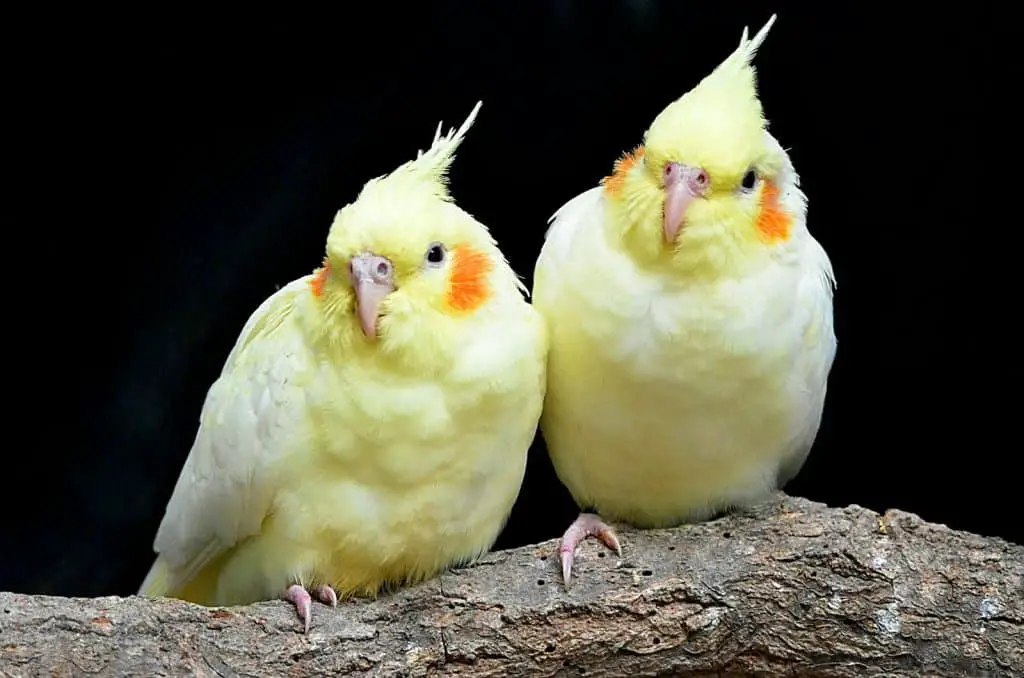
Health and wellness are essential in ensuring your cockatiel leads a long and happy life. By keeping a close eye on their health and maintaining regular veterinary care, you can manage any health issues that emerge promptly.
Routine Veterinary Checks
Consistent veterinary checks are crucial for a healthy cockatiel. You should schedule visits with an avian veterinarian at least once a year to ensure their overall health and to vaccinate against common diseases if recommended. During these checks, the veterinarian can assess your bird’s weight, feathers, and general physical condition. These regular assessments help catch any potential health issues early, making treatment more effective. Additionally, it’s a good time to discuss your cockatiel’s diet and any changes in their behavior that might indicate health problems.
Recognizing Signs of Ill Health
Knowledge of the signs of illness is critical in caring for your cockatiel. Common indicators of ill health include changes in eating habits, lethargy or less vocalization, ruffled feathers for extended periods, and changes in droppings. Watch for any signs of respiratory distress, such as wheezing or coughing, as these can suggest serious conditions requiring immediate attention.
Also, look out for feather plucking or unusual bald spots, as these can indicate stress or a nutritional deficiency. If you notice any of these symptoms, contact your avian veterinarian immediately to diagnose any issues and begin treatment, thus ensuring your cockatiel’s quick recovery and continued health. Regular monitoring and prompt action if you spot signs of distress help maintain your cockatiel’s wellness significantly.
Maintenance and Cleaning
Proper maintenance and cleaning of your cockatiel’s environment are essential to their health and happiness. This section guides you through the necessary daily and weekly tasks to keep your bird’s cage clean and your feathered friend in top condition.
Daily and Weekly Cleaning Tasks
Regular cleaning is paramount in preventing the buildup of harmful bacteria and ensuring your cockatiel’s home is safe and comfortable. Daily, you need to replace the water in the water dishes to ensure your cockatiel has access to fresh water. It’s also important to remove any uneaten food from the food bowls to prevent spoilage and contamination.
Weekly, deep cleaning of the cage is necessary. Start by removing your cockatiel to a safe space. Then, take out all the toys, perches, and removable items for washing. Clean these items with warm water and a clean spray bottle filled with a bird-safe disinfectant solution, ensuring they are thoroughly rinsed and dried before placing them back in the cage.
Next, scrub the cage’s bars and the bottom of the cage, where droppings and food debris accumulate. Replace the substrate or liner at the bottom of the cage with fresh material to keep the area dry and odor-free.
Furthermore, inspect the cage for any signs of wear or damage, such as sharp edges or loose wires, which could harm your cockatiel. Regular checks and maintenance can prevent injury and keep your pet bird secure in their environment. Remember to provide a special treat after cleaning, which can help ease your cockatiel back into their refreshed habitat. This process not only ensures a hygienic living space but also keeps your pet healthy and reduces the risk of diseases.
- FAST-ACTING FORMULA: Our cleaner, using its natural enzymes, is incredibly fast-acting and easy to use. Just thoroughly spray the area with bird cage cleaner that has bird poop, let sit 3-5 minutes, use a wet cloth or cleaning brush to loosen and remove the bird poop. Fast-acting and effective stain and odor eliminator pet, no matter the pet's diet.
- POWERFUL NATURAL ENZYMES: Absolutely Clean Amazing Bird Cage Cleaner stain remover uses Powerful, Natural Enzymes to break down the smell and tough debris from bird droppings in your bird cage. Our bird cage accessories does not give off the noxious fumes that youll find with other cleaners making for a more pleasant cleaning experience. Effortlessly remove bird poop off with the cleaning supplies of Absolutely Clean Amazing Bird Poop Remover.
- WORKS GREAT ON UPHOLSTERY: Absolutely Clean Amazing Bird Cage Cleaner is extremely versatile. It is a powerful pet enzyme cleaner to remove the toughest pet stains and pet odor from all of your indoor upholstery and patio furniture as well as your hardscapes. Thoroughly cleaning and refreshing your outdoor living spaces with all purpose cleaner, so you can relax and enjoy, no matter what nature throws your way.
- VETERINARIAN APPROVED: Our vet-approved pet carpet cleaner is made without the use of harsh chemicals or noxious fumes, making for a gentle yet powerful enzyme carpet cleaner for removing the toughest stains and eliminating the most stubborn odors.
- MADE IN THE USA: Absolutely Clean is a small, family owned-and-operated company based in Colorado. We make our pet odor carpet cleaner products at home in the USA. We believe in providing an exceptional cleaning experience for our customers by providing high-quality products. No matter what your cleaning needs are, Absolutely Clean has the pet supplies for you!
Mental Stimulation and Social Interaction
Providing mental stimulation and social interaction is crucial for maintaining your cockatiel’s happiness and overall well-being. Engaging toys and regular human contact help prevent common issues like boredom and feather plucking.
Toys and Activities
Toys play a vital role in keeping your cockatiel entertained and mentally stimulated. Select a variety of toys that encourage different types of play behavior, such as chewing, foraging, and puzzle-solving. Examples include hanging toys, chewable wood pieces, and bells. Rotate toys regularly to keep the environment fresh and engaging, which helps prevent boredom and stimulates your cockatiel’s natural curiosities. Place these toys at different levels in the bird’s cage to encourage movement and exploration.
The Importance of Human Contact
Cockatiels thrive on social interaction, making your companionship essential for their emotional health. Spend at least a few hours each day interacting directly with your cockatiel. This can include talking, gentle petting, and training sessions to teach new tricks. Regular handling not only strengthens your bond but also helps your feathered friend become more comfortable with human contact.
Additionally, ensure your bird occasionally interacts with other people to help it stay well-adjusted and friendly towards new acquaintances. Such interactions are invaluable, especially if your bird spends long periods alone during the day. Remember, a socially engaged cockatiel is typically a happy and healthy cockatiel.
Final Thoughts: How do you care for your cockatiel everyday?
Caring for your cockatiel involves more than just meeting their basic needs—it’s about enriching their lives and nurturing their emotional health through consistent interaction and mental stimulation. By integrating engaging toys and regular human contact into your daily routine you’ll ensure your feathered friend remains both happy and healthy. Remember that the quality of the time you spend together is just as important as the quantity. Embrace these practices and watch as your cockatiel thrives in a loving and stimulating environment.
Other suggested articles:
